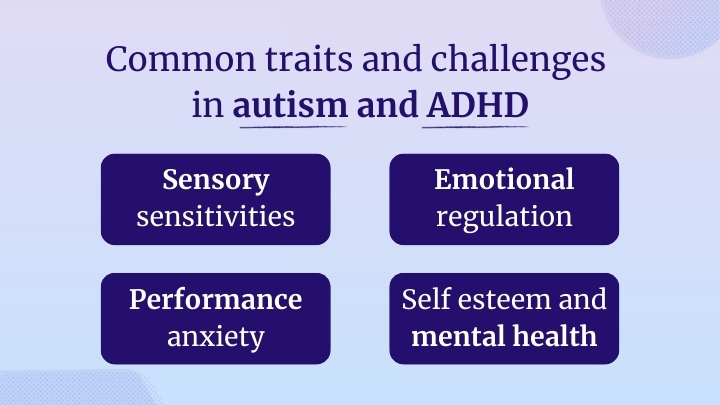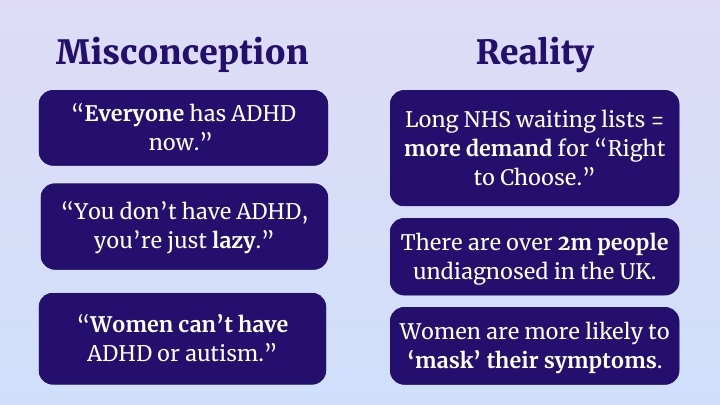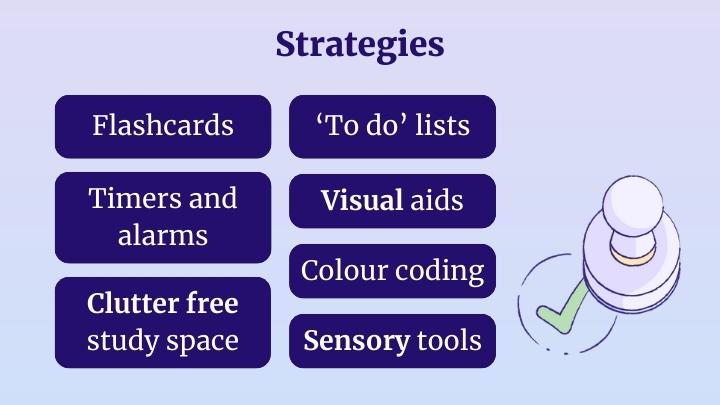Our inclusion team teamed up with a Kaplan apprentice to discuss techniques for those diagnosed, and peers and colleagues of those diagnosed, with ADHD or autism.
Event panellists
The webinar was led by members of the inclusion team here at Kaplan.
- Amena Dakhil - inclusion coordinator
- Kirsty Gibson - inclusion coordinator
- Rebecca Williams - inclusion support advisor
- Niamh Clarke - Kaplan apprentice and Senior Associate at PwC.
Common traits and challenges with ADHD and autism
The panellists talk through some of the common traits, with the highlighted examples (sensory sensitivities, emotional regulation, self-esteem and mental health, and performance anxiety) representing some of the common challenges for both ADHD and autism.

Personal experience: studying with ADHD
Niamh Clarke is invited to share her experiences as a Kaplan apprentice on a graduate scheme at PwC. She currently works as a Senior Associate as she studies towards her ICAEW ACA qualification.
While navigating a new routine which involves balancing intense work periods with important exams, Niamh noticed the challenges she was facing due to her ADHD.
Some examples of distractions or challenges mentioned by Niamh include:
- Visuals/lights - Niamh talks about how it can be difficult to concentrate if the lights are too bright in a classroom.
- Noises - learners with ADHD may struggle with external noises. Some examples mentioned are obvious noises such as typing on a keyboard to struggles such as refraining from joining in a conversation that’s happening near where you’re working.
- Time management - also often referred to as ‘time blindness,’ Niamh explains how everyday tasks such as managing her calendar, replying to emails, or trying to avoid procrastinating after initiating tasks herself can be very difficult due to her ADHD.
- Mental health challenges - Niamh explains how her struggles with time management, inattentiveness, and procrastination may then result in a decline in her mental health. She talks about often comparing her performance and progress, at work and while studying, to her peers.
- Socialising - Niamh also mentions the expectations to socialise when at work or around people. She expands by sharing that having many conversations in a day can lead to symptoms of fatigue, inattentiveness, and a significant drop in her energy.
ADHD hyperfixation
Kirsty and Niamh talk about what hyperfixation means and how it’s a common trait for people with ADHD.
Although it can feel great to complete a task when struggling with inattentiveness, ADHD hyperfixation can make you forget other priorities. Niamh shares her experience with hyperfixation.
“If you’ve given me a task to do, I’m going to get it done whether it takes me two hours or ten hours.
But that’s not healthy, and that’s not sustainable in the long-term.”
Niamh also explains that although it can be difficult to pull yourself away from a task, it’s important to reach out to people who can be there to remind you when it’s time to take a step back.
Concentration techniques
Every learner has different needs and requirements that work from them - this is also the case when it comes to concentration and study techniques. Not all techniques will work for everyone, as it depends on the individual.
However, some examples of what helps Niamh with her concentration include:
- Headphones - as well as Niamh, many participants in the chat agreed that the use of noise-cancelling headphones can make a huge difference when trying to concentrate. There are also headphones provided by us at Kaplan during exams if needed.
- Having your own space - due to the pressures to socialise, Niamh mentions how being in your own space away from others can help maintain your energy and concentration levels.
- Darker rooms - similar to having your own space, a darker room can help if bright lights are causing distractions or impacting your concentration and productivity.
Misconceptions
The panellists, Niamh, and attendees in the chat share any misconceptions they’ve heard about ADHD and autism.
Some examples of myths and misconceptions include:
- Autism and ADHD are childhood conditions that you ‘grow out of’
- People with ADHD or autism cannot be successful in study or work
- All individuals with ADHD or autism have the same difficulties
- ADHD and autism are just behavioural issues
- ADHD is an excuse for laziness
- ADHD and autism are found in young boys and do not apply to women
- If you have autism, you can’t be good at teamwork
- If you have ADHD, you can’t concentrate for long periods
- You must express symptoms before age 12
- You can’t have ADHD or autism if you’ve never struggled academically before.
Let’s take a look at the realities behind those misconceptions…
- The “Right to Choose” programme for ADHD assessments have gained visibility and prominence due to long NHS waiting lists - leading to more diagnoses.
- A study by University College London (UCL) between 2000 - 2018 saw a 20-fold increase in ADHD diagnoses. The largest was in adults.
- There are still over two million people with ADHD that are undiagnosed.
- ADHD affects how the brain transmits neural messages, making it harder for people with ADHD to initiate or maintain tasks.
- Females are more likely to have symptoms of inattentiveness. This means their behaviour is usually less disruptive or obvious than males - making it more difficult to identify their symptoms.
- Women are more likely to ‘mask’ or ‘camouflage’ their symptoms.
- Autism assessments are less sensitive to autistic traits that are more commonly found in women and girls.
- It’s not uncommon for someone with ADHD to mask their symptoms to fit in with society’s expectations - meaning it’s not impossible for someone with ADHD to not notice their symptoms before age 12.

Challenges for someone with autism
Rebecca talks more about autism and the challenges that someone with this diagnosis may face.
Some of the examples that Rebecca mentions are:
- Sensory challenges - similar to someone with an ADHD diagnosis, sensory challenges such as smells and visuals can impact someone with autism during their studies or while sitting an exam.
- Expectations of society - as mentioned earlier by Niamh, expectations of how to act or of when/how much you should speak to others can be difficult to navigate.
- Understanding instructions - if someone is struggling to process verbal or written instructions could lead to a lack of focus.
- Managing change - whether it be a routine, structure, or sitting at a particular desk in class, it can be very difficult to manage change without feeling nervous, overwhelmed, or losing focus.
- Social cues - similar to the expectations of society, it can also be difficult to interpret social cues. If someone is diagnosed with autism, this can also lead to further struggles of advocating for their needs.
- Self-esteem and mental health - the aforementioned challenges can lead to negative thought processes and self-doubt which can result in performance anxiety during exams, studies, or work.
While these challenges can be difficult to navigate when working or studying, Rebecca highlights how Kaplan can make adjustments to try and help - such as sole occupancy exam rooms.
Other challenges mentioned in the chat panel:
Throughout the webinar, those who joined the conversation are invited to share any of their thoughts, struggles, or questions in the chat panel.
Some of the conversations in the chat include:
- Forgetting to eat - Niamh references this comment when explaining the challenges that come when hyperfixating on a task. It can be easy to forget to eat, prioritise other tasks, or take care of your well-being if you’re focused on just one thing.
- Sensory overload - many people in the chat could also relate to sensory overload challenges such as smells, visuals, and noises
- In addition to this, some more specific examples include noises like someone chewing, conversations, fluorescent lights, or the smell of food at lunchtime in the office.
- Struggling to read - fitting in with sensory challenges, one example mentioned the difficulties trying to read a text while people are talking.
- Loop earplugs - a common theme in the chat was the benefits of loop earplugs to cancel out unwanted noises. An online quiz is also available to determine which headphones are best for you.
Strategies for learning and successful study
The panellists talk through some study techniques and strategies in more detail. They focused on specific challenges such as time management, organisation, a cluttered environment, and general study tips, like mapping your most active times, that can help for people diagnosed with ADHD and autism to stay focused.

Other suggestions included investing in a walking pad or an ADHD-friendly chair (other names or examples may also include ‘active chair,’ ‘meditation’ or ‘cross-legged chair,’ or ‘kneeling chair’) which may help you concentrate and stay focused while still moving your body.
Artificial intelligence and study plans
The conversation moved onto digital tools, which included the topic of artificial intelligence (AI) and how this can be used to create study plans.
Other digital tools mentioned include:
- Forest - an application where a tree grows as you keep focused. If you leave the app, the tree will die. Credits earnt can then be used to plant real trees around the world.
- Goblin tools - an application and website tailored towards helping users organise their tasks. This tool is designed to help with task management, productivity, communication, organisation, overcoming writer’s block and more.
- Habitica - an application and Chrome extension that helps users build habits and maintain productivity by gamifying tasks.
- ChatGPT - a Gen AI chatbot that can help with just about anything such as creating study plans, offering advice, and providing more tips and resources.
- Google Calendars (or any other online calendar) - online calendars to help set reminders and schedule in focus time to limit distractions when working or studying.
- Natural reader - a text-to-speech application that uses AI generated voices to read text aloud.
- Read&write - a support tool that offers text-to-speech, help with understanding familiar words, researching topics, and proofing work.
Support is available at Kaplan
The panellists talk through ways we can support you at Kaplan if you are diagnosed, or believe you have symptoms, of ADHD or autism.
Get in touch with the inclusion team via the email als@kaplan.co.uk.
They can assist with diagnosis or support with your learning materials.
Some ways they can assist include:
- Supporting with earlier access to course materials
- Providing advice and guidance on how to get a diagnosis
- Providing advice and guidance on strategies and tools
- Providing advice and guidance on exam access arrangements and help you decide what arrangements are best for you
Ways the inclusion team can help with exam support includes:
- Arranging extra time
- Stop the clock breaks to help you stop and regain focus
- Provide a reader or scribe
- Arrange sole occupancy exam rooms
- Remote sitting options
- Provide colour overlays and other resources to help with reading and concentration.
Get in touch for additional support
For more information on how we can support you at Kaplan, get in touch with the team who will be happy to help.